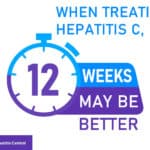Two New Interferon Studies from Schering
Perhaps the most telling part of the following announcment is the acknowledgment of the fact that genotype is one of the key factors in determining current treatment success rates. And the most common genotype for 70% of people is also the most resistant to current treatment.
Of course, if Schering can show that longer treatment gives a higher success rate then they can sell more Pegintron plus Rebetol. Be sure to note that they are not concurrently checking to see what effect sustained use of their product might have on the patient with regard to side-effects. Not a surprising fact, but still noteworthy.
The second study being initiated is to determine whether or not Schering’s product could help people that the Roche product could not. Schering has nothing to lose on this one. If their product doesn’t help, it is no worse a result than Roche’s. If it does work they can claim superiority (and also sell a lot more product to those who did not respond to Pegasys).
Also noteworthy is the fact that according to Professor Stefan Zeuzem, M.D. the therapeutic goal of the medical community is “eradication of the virus”. This is in spite of the fact that 70-80% of people will never face life threatening ramifications from chronic Hepatitis c. Instead of finding ways to protect and support the liver and immune system until a more viable (and less toxic) treatment is found, the medical community is intent on “eradication” at almost any cost. Could it be because there is less money in fortification than there is in pharmaceutical treatment? I don’t know, what do you think?
Schering-Plough Initiates Two Major Hepatitis C Studies With PegIntron(R) Plus Rebetol(R) Combination Therapy
BRUSSELS, October 22 /PRNewswire/ —
– International Clinical Trials To Assess PegIntron in Patients with Unmet Medical Needs
Schering-Plough announced today that it is initiating two large international clinical trials to evaluate the use of PegIntron(R) (peginterferon alfa-2b) and Rebetol(R) (ribavirin) combination therapy in patients chronically infected with hepatitis C virus (HCV) genotype 1 who have specific unmet medical needs.
The first study will involve patients identified as “slow” responders to HCV therapy; the second study will involve patients who were non-responders to previous treatment with Pegasys (peginterferon alfa-2a) plus Copegus (ribavirin) (Hoffmann-La Roche, Inc.) combination therapy. Currently, there are no approved products for treating these patient populations.
“We have made great advances over the past decade in the effective treatment of chronic hepatitis C, one of the most common blood borne infections in the world,” said Robert J. Spiegel, M.D., chief medical officer and senior vice president of medical affairs, Schering-Plough Research Institute. “Still, specific patient populations with difficult-to-treat forms of the disease remain resistant to therapy and need improved treatment options. Schering-Plough is undertaking these studies because it is critical to develop new strategies for improving treatment outcomes for these patients.”
Of the six distinct known hepatitis C genotypes, HCV genotype 1 is the most common worldwide (about 70% of patients). It is considered the most difficult-to-treat strain of the virus and is associated with higher resistance to treatment (lower response rates) when compared with HCV genotypes 2 and 3.
Adjusting Treatment Duration for “Slow” Responders
Schering-Plough is sponsoring the SUCCESS trial: “A Study to Assess Treatment with PegIntron and Rebetol in Naïve Patients with Genotype 1 Chronic Hepatitis C and Slow Virological Response,” that will evaluate whether extending treatment to 72 weeks instead of the standard 48 weeks will improve efficacy in genotype 1 chronic hepatitis C patients who respond slowly to treatment. Slow responders are defined as those patients who still have detectable virus levels after 12 weeks of treatment (PCR positive), but do show a significant (2 log10) drop in viral load. Such patients may ultimately achieve undetectable virus levels (PCR negative) between weeks 12 and 24, and may benefit from a longer overall course of therapy (72 weeks) than the current recommended duration of 48 weeks.
This prospective, controlled, randomized, parallel-group multicenter study is expected to enroll 1,200 previously untreated patients with chronic hepatitis C at more than 100 sites in Europe, Eastern Europe, Israel and Canada. The study hypothesis is that patients who become HCV-RNA negative (achieve undetectable levels of the virus) between treatment weeks 12 and 24 (slow responders) may need a longer period with undetectable virus to successfully clear the virus and ultimately achieve a sustained virologic response (SVR). SVR is defined as having undetectable virus 24 weeks after completing therapy. In the study, patients who achieve a late response to therapy (as measured at week 24) will be randomized at the end of 48 weeks of therapy with 1:1 ratio to either stop treatment or extend the trial to 72 weeks.
“Success in treating patients with chronic hepatitis C depends on a number of factors, with genotype considered one of the most important predictors for achieving sustained virologic response,” said Professor Maria Buti Ferret, M.D., co-lead investigator of the study with Professor Rafael Esteban Mur, M.D., both of Vall d’Hebron Hospital, Barcelona, Spain. “We know from previous clinical studies that patients with HCV genotype 2 or 3 can achieve SVR with shorter 24-week courses of treatment. Conversely, this study will help us to determine if a longer 72-week course of PegIntron and Rebetol benefits those patients with difficult-to-treat genotype 1 who are slow to respond.”
PegIntron plus Rebetol in Non-Responders to Pegasys plus Ribavirin
In the ESPECIAL trial: “Efficacy and Safety of PegIntron plus Rebetol in Subjects with Chronic Hepatitis C Genotype 1 Non-Responder to Pegasys plus Ribavirin,” patients infected with HCV genotype 1 who did not respond or relapsed following an initial course of treatment with Pegasys (180 mcg/wk) plus Copegus (1,000/1,200 mg/day) will be treated with weight-based PegIntron (1.5 mcg/kg/wk) plus Rebetol (800-1,400 mg/day) combination therapy for 48 weeks. This international multicenter clinical trial will involve 200 patients.
“The therapeutic goal of treatment for chronic hepatitis C is the eradication of the virus with a halt in the progression of the disease,” said Professor Stefan Zeuzem, M.D., Saarland University, Homburg, Germany, and lead investigator of the study. “We need effective alternatives for the sizable number of patients who did not clear the virus with initial treatment. PegIntron and Pegasys are different drugs, with different pharmacokinetic and pharmacodynamic properties. Patients who did not respond or relapsed to Pegasys plus Copegus may respond to PegIntron plus Rebetol,” he said.
The primary endpoint of the study will be the proportion of patients who have achieved sustained virological response (SVR) at 24 weeks after the end of treatment. Secondary endpoints of the study include early virological response (EVR), defined as undetectable virus levels (PCR negative) at week 12 of treatment; the response rate at the end of 48 weeks of treatment (EOT); and sustained virological response (SVR) rates based on subject weight, viral load, presence of cirrhosis, insulin resistance status and creatinine clearance status.
The SUCCESS and ESPECIAL trials are consistent with Schering-Plough’s research strategy to conduct and support clinical studies with weight-based PegIntron and Rebetol combination therapy in hepatitis patients with unmet medical needs, particularly for better efficacy in patients with difficult-to-treat forms of the disease such as HCV genotype 1, the most common genotype worldwide.
About PegIntron and Rebetol Combination Therapy
PegIntron and Rebetol combination therapy for chronic hepatitis C was approved in the European Union (EU) in March 2001, and is indicated in naïve patients as well as in patients who have previously responded to interferon alpha monotherapy but who have subsequently relapsed. PegIntron is indicated in the EU as a monotherapy in cases of intolerance or contraindication to ribavirin for the treatment of adult patients with chronic hepatitis C. The recommended dose in the EU for combination therapy is PegIntron 1.5 mcg/kg once weekly plus Rebetol 800-1,200 mg daily, adjusted to body weight.
PegIntron, recombinant interferon alfa-2b linked to a 12,000 dalton polyethylene glycol (PEG) molecule, is a once-weekly therapy dosed according to patient body weight that is designed to achieve an effective balance between antiviral activity and elimination half-life. Rebetol is an oral formulation of ribavirin, a synthetic nucleoside analog with broad-spectrum antiviral activity.
Chronic hepatitis C is estimated to affect more than 10 million people in major world markets. In Europe, chronic hepatitis C is a leading cause of chronic liver disease and one of the most common reasons for liver transplant.
Schering-Plough Europe, based in Brussels, Belgium, is part of Schering-Plough Corporation (NYSE: SGP) of Kenilworth, N.J., USA.
Schering-Plough is a global science-based health care company with leading prescription, consumer and animal health products. Through internal research and collaborations with partners, Schering-Plough discovers, develops, manufactures and markets advanced drug therapies to meet important medical needs. Schering-Plough’s vision is to earn the trust of the physicians, patients and customers served by its more than 30,000 people around the world. The company is based in Kenilworth, N.J., USA, and its Web site is http://www.schering-plough.com.







